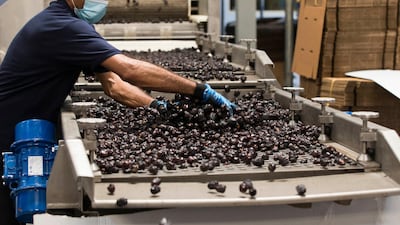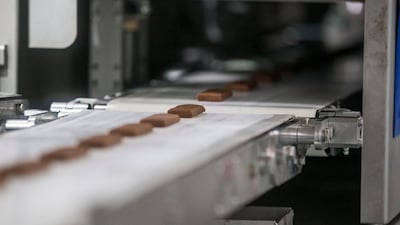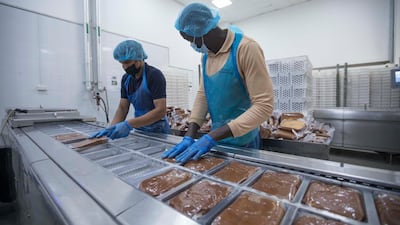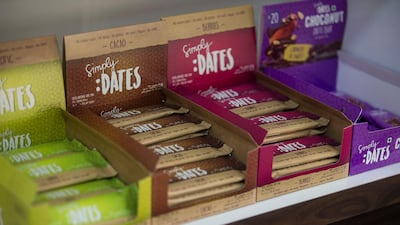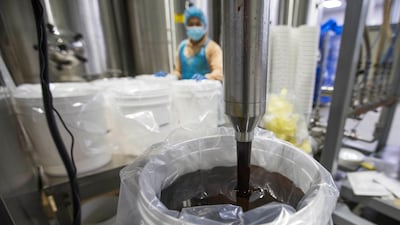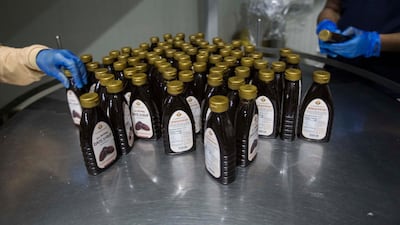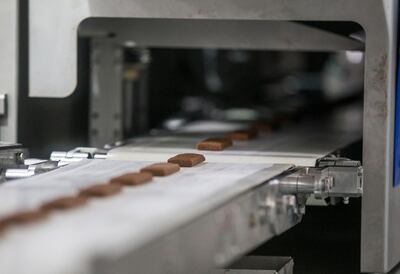As you walk through the doors of Al Barakah Dates Factory in Dubai, a warm, sweet-smelling aroma immediately fills your nose.
Tucked away in an industrial area on the Dubai-Abu Dhabi border, you will find thousands of sweet dates on the factory's production line.
Here, 250 staff work round the clock, processing the humble fruit found in cupboards and fridges in homes throughout the world.
Dates are brought in from farms across the UAE, Saudi Arabia, Iraq and Algeria.
The 23,000-square-metre plant produces 225 tonnes of date paste, syrup and sugar each day – not to mention 100 tonnes of whole fruit for packaging.
"We add nothing to our products," said Yousuf Saleem, 32, director of Al Barakah Dates Factory.
"Depending on whether we are making paste, syrup or sugar powder, the process changes slightly, but it starts and ends with one sole ingredient – the date."
The plant processes about 20 different varieties, including barhi and ajwa dates.
"I start every day off by eating three dates," Mr Saleem said. "I love them.”
From humble date to family favourite
So what makes a perfect date? The hotter the climate, the better the crop.
Date palms require a lot of watering, Mr Saleem said. This has to be done at the root, to prevent the trunk from getting wet.

"Rain is a big no-no at the time of pollination because it will cause the buds to fall off," he said.
At the time of harvest, if it rains, insects will breed and damage the harvest, Mr Saleem said.
"The crop is essentially ruined if water gets on the date," he said.
Lighter coloured varieties tend to come from trees growing on dry, arid land. In areas with more humidity, the date often appears darker, but the taste does not vary too much.
How are dates processed?
Preparing dates or date products takes little in terms of processing.
The first step is to remove any dust or debris.
In the Dubai factory, whole dates pass through vibrating metal tables, which are fitted with sprinklers and brushes for cleaning.
The vibration helps in grading the dates.
Smaller fruit pass through screens on the production line and are later processed into paste.
The larger ones are packed and stored for export.
If you are making a paste, syrup or sugar powder, the process differs slightly and requires a few additional steps, namely a 30-minute heat treatment.
"We can't detail the full process as we don't want to give too much away, but from start to finish any given product can take as little as a few minutes to a few hours to process," Mr Saleem said.
“Once it comes off the production line, products are left to dry before being packaged, but they are never chemically dried.
“The shelf life on all our products is about 18 months."
In the shop, a kilogram of date paste sells for Dh15 and below, while a 5kg crate of whole medjool dates goes for about Dh150.
Seeds and excess fibres are sold for animal feed, so nothing from the date is thrown away.
A rich history with dates
Mr Saleem's father, Saleem Mohamed, moved to the UAE from Sri Lanka in 1983 and started trading dates and spices.
Three decades later, in 2010, he opened the factory and started processing his own dates.
Despite the pandemic bringing many businesses to a halt in 2020, last year was the Saleem family's "best year to date" .
Covid-19 prompted many people to choose healthier foods, Mr Saleem said.
“Initially, people who were most affected by the virus tended to have underlying health issues, so they started being proactive with diets by cutting out refined sugars," he said.
“Dates are vegan-friendly and gluten and dairy-free. They’re a great sweet alternative to refined sugar and can be added to salads and desserts.
"The introduction of sugar tax, which hiked prices of products with refined sugar, has increased demand for things like date paste and date sugar too, as more companies are looking to produce healthier, sweet products."
Today, Al Barakah, which in English means blessing, exports about 95 per cent of its products to 79 countries.
Whole dates make up 50 per cent of its output. Last year, the company processed 90,000 tonnes of dates.
In terms of market demand, whole dates are most popular in the Far East and in Bangladesh, Indonesia, Malaysia and India.
The majority of date products are sent to Europe, North America, Australia and New Zealand and are often used in health bars and snacks.
The company is expanding operations and by August will add an additional 45,000 square metres to its current space.
Once complete, the factory will have more than 6,500 solar panels to offset 3,000 tonnes of emissions per year.
"Overall demand has driven this expansion," Mr Saleem said.
"Consumption is increasing and our demand for date ingredients is growing exponentially because so many people are using them as a natural alternative to sugar.
“Our biggest issue today is insufficient storage space. Our finished goods tend to stay in-house for two to three days but we need more space to stock raw material to cater to the growing demand.”
